Stephen P. Kershaw
Kershaw. Stephen P.
Stephen P. Kershaw is a Classics scholar with a particular interest in mythology. He was editor of The Penguin Dictionary of 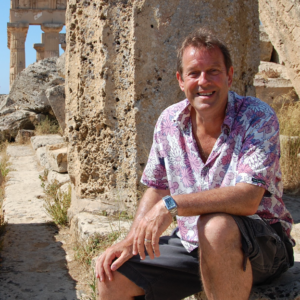 Classical Mythology [1406] and has published a short series in his own right; A Brief Guide to the Greek Myths [1407], A Brief Guide to Classical Civilization [1408] and A Brief History of the Roman Empire [1409]. In September 2017, A Brief History of Atlantis [1410] was published, which is a valuable introduction to the wide variety of opinions regarding Atlantis that have been expressed since the time of Plato.
Classical Mythology [1406] and has published a short series in his own right; A Brief Guide to the Greek Myths [1407], A Brief Guide to Classical Civilization [1408] and A Brief History of the Roman Empire [1409]. In September 2017, A Brief History of Atlantis [1410] was published, which is a valuable introduction to the wide variety of opinions regarding Atlantis that have been expressed since the time of Plato.
His first chapter gives a number of instances where highly regarded ancient geographers have been quite inaccurate, citing the Roman belief that the west of Britain faced south. He concludes with ”the point here is that whether we are dealing with descriptions of the mythical Scherie, the real Britannia of Plato’s Atlantis, ancient geographical knowledge can be vague and contradictory.”
Kershaw is an Atlantis sceptic who concludes that ”Too many difficulties get in the way of accepting Plato’s story at face value: the chronology of putting a developed civilisation in the Mesolithic period; the geological impossibility of there being a sunken continent beneath the Atlantic; the total absence of any finds from the ancient world carrying the name Atlantis; and the fact that there is no mention anywhere of Atlantis in any ancient text prior to Plato’s – not even in Herodotus or Solon. Put bluntly, there is no source of the Atlantis story other than Plato. Atlantis is just a tale from Egypt ‘the most brilliant and enduring of all hoaxes’(Trevor Bryce [1499])”
With regard to the above, I must point out that the date for Atlantis noted by Plato is regarded by many atlantologists as a corruption and have offered a number of possible explanations for what is obviously incorrect. With regard to an Atlantic location, I along with others favour a Mediterranean setting. The name Atlantis was part of the Hellenising of the narrative recounting the war with an alliance whose members were likely to have been known by a variety of different names. Plato also explains how Greece lost much of its history as a result of catastrophic floods (Timaeus 23b), which may explain why the Atlantis story was new to Solon.
Thorwald C. Franke has written a valuable and hard-hitting critique of Kershaw’s Atlantis book(a).
In January 2017, the University of Oxford began a short course on Plato’s Atlantis with Kershaw as the lecturer.
October 2018 saw the publication of Kershaw’s The Search for Atlantis [1585] which deals with the manner in which Plato’s narrative has been received over the centuries.
>This is now freely available online(c).<
What I found unexpected was the lukewarm review that Kershaw’s book was given by fellow Atlantis sceptic, Jason Colavito(b).
(a) https://www.atlantis-scout.de/kershaw-brief-history-atlantis-review-engl.htm
(b) https://www.jasoncolavito.com/blog/review-of-the-search-for-atlantis-by-steve-p-kershaw
(c) https://files.secure.website/wscfus/10582237/26180857/the-search-for-atlantis-team-enki.pdf *
Peyrére, Isaac La
Isaac La Peyrère (1596-1676) was a French philosopher, lawyer and diplomat. Although brought up a Calvinist, he was later forced to convert to Catholicism. His theological views created quite a stir when he put forward the theory of humans existing before Adam & Eve in an attempt to explain where Cain’s wife came from. He argued that there must have been two creations; first the creation of the gentiles and later of Adam, as the father of the Hebrews.
quite a stir when he put forward the theory of humans existing before Adam & Eve in an attempt to explain where Cain’s wife came from. He argued that there must have been two creations; first the creation of the gentiles and later of Adam, as the father of the Hebrews.
He published his claims in 1655 in Praeadamitae[1300], upsetting Catholics, Protestants and Jews. Stephen P. Kershaw relates[1410] how Peyrère added the testimony of Solon and Plato to bolster his claim, arguing that if Atlantis in 9600 BC, then humans existed earlier than Genesis suggests.
Thorwald C. Franke noted in a paper(b) on The Dark Side of Atlantis Scepticism that Peyrère’s “work was immediately condemned by the church and the author put to prison. Shortly after that, Isaac La Peyrère had to recant his opinion. Thus, Atlantis scepticism had triumphed once more.”
Some of his ideas are widely accepted today(a).
(a) Were Adam and Eve the first humans? (archive.org)
(b) (99+) The Dark Side of Atlantis Scepticism | Thorwald C. Franke – Academia.edu *
University of Oxford
The University of Oxford through its Department for Continuing Education offered a weekly course over two months on Plato’s Atlantis commencing in January 2017, for a fee of £195. The course had a comprehensive programme beginning with Plato, Greek myths, Plato’s text, how the Atlantis story was viewed after Plato until the present and ending with a review of today’s search for and possible location of Atlantis.
The lecturer was Stephen P. Kershaw, a specialist in Greek mythology[1407] , who was due to have A Brief History of Atlantis published as a Kindle book[1410] in September 2017.
Salazar, Francisco Cervantes de
Francisco Cervantes de Salazar (1514-1575) was a Spanish academic who 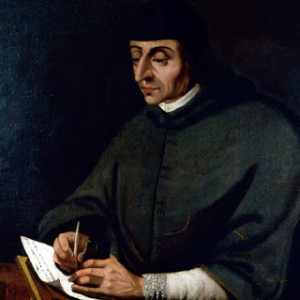 travelled to Mexico around 1550 where he was twice elected rector of the newly established University of Mexico. In his Crónica de la Nueva España, he was a firm supporter of the idea of interpreting Plato’s 9,000 ‘years’ as lunar cycles, echoing the early statement of Eudoxus of Cnidos. His Crónica was not published until 1914[1517].
travelled to Mexico around 1550 where he was twice elected rector of the newly established University of Mexico. In his Crónica de la Nueva España, he was a firm supporter of the idea of interpreting Plato’s 9,000 ‘years’ as lunar cycles, echoing the early statement of Eudoxus of Cnidos. His Crónica was not published until 1914[1517].
Stephen P. Kershaw has noted[1410.161] that Salazar, along with many others, was strongly influenced by the opinions of Marsilio Ficino.
Columbus, Christopher
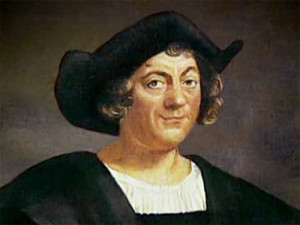 Christopher Columbus (1451-1506) is the name usually associated with the ‘discovery’ of America in the late 15th century. However, there appear to be a number of questions now being raised about the discoverer’s identity. Manuel Rosa seems to be leading the charge with his 2016 book, Columbus: The Untold Story[1889]. In a more recent article, Rosa succinctly claimed that “Historians mixed up the noble navigator Colón with the peasant weaver Colombo, giving the wool-weaver the glory that did not belong to him.” The article describes a convoluted but fascinating story of forgery, mistaken identity and misinformation that is well-documented and deserves a read(d).
Christopher Columbus (1451-1506) is the name usually associated with the ‘discovery’ of America in the late 15th century. However, there appear to be a number of questions now being raised about the discoverer’s identity. Manuel Rosa seems to be leading the charge with his 2016 book, Columbus: The Untold Story[1889]. In a more recent article, Rosa succinctly claimed that “Historians mixed up the noble navigator Colón with the peasant weaver Colombo, giving the wool-weaver the glory that did not belong to him.” The article describes a convoluted but fascinating story of forgery, mistaken identity and misinformation that is well-documented and deserves a read(d).
Columbus’ nationality is the subject of ongoing controversy although the majority accept him as Italian as there documentary evidence that he was born in Genoa. Pedants argue that as Italy did not exist as a state until the 19th century he cannot be called Italian. Up until then it was known as the Republic of Genoa (1099-1797). Apart from that, both Spain and Portugal have claimed that he belonged to their respective nations(f).
>Nevertheless, in 2024, it was revealed the matter of Columbus’ background to be even more complex, with the claim that based on a new DNA study on his 500-year-old remains it was found that the controversial explorer was actually a Sephardic Jew from western Europe(i). Unsurprisingly, these claims were swiftly challenged(j).<<
Ruggero Marino the author of Christopher Columbus: The Last Templar [1915], claims that he has evidence that Columbus’ first trip to the Americas was in 1485 for Pope Innocent VIII, not the better-known voyage for Ferdinand & Isabella of Spain in 1492(e)!
Columbus is not known to have made any specific statements regarding Atlantis, but some commentators have suggested that he was not only aware of Plato’s story but had consulted charts, such as Toscanelli’s(a), that depicted a mid-Atlantic island. López De Gomara was insistent that Columbus had read Plato’s Timaeus and Critias, while the historian, Bartolomé de las Casas (1484-1566), claimed that Plato’s story inspired Columbus to embark on his voyages of discovery!
A chart created by Paolo dal Pozzo Toscanelli (1397-1482) is also claimed to have been used by Columbus. However, the authenticity of the chart and associated correspondence was challenged by Henry Vignaud in a 1902 book(h), The Letter and Chart of Toscanelli[2091], which, understandably, generated considerable controversy(g) .
Toscanelli’s chart shows Antillia as a halfway marker from Portugal to Cipangu (Japan), which Columbus erroneously thought could be found on the other side of the Atlantic!
In the third chapter of The Message of Atlantis[494], Roger Coghill offers a vivid account of the background to Columbus’ protracted efforts to get support for his great voyage of discovery.
It is claimed that two of Columbus’ ships were built by Basques and that a quarter of their crews were Basque(b).
Nevertheless, S. P. Kershaw[1410.163] quoting from B. Keen[1500] notes that Columbus’ son Ferdinand ”explicitly stated that his father never showed any interest in Plato’s tale.”
The Flem-Aths in their Atlantis Beneath the Ice, which is a 2012 revised version of When the Sky Fell, begin the book with a reference to a memorandum sent by Charles Hapgood to President Eisenhower. In it, Hapgood sought the president’s assistance in locating a map used by Columbus, which he believed to still exist in Spanish archives. This map(c) was apparently one of a number used by Piri to produce his famed Piri Reis Map, which allegedly depicts an ice-free Antarctica. The Columbus map was not found.
(a) https://es.wikipedia.org/wiki/Archivo:Toscanelli_map.jpg
(b) https://www.quora.com/Is-it-true-that-Ancient-Greeks-knew-about-the-existence-of-America?share=1
(c) Saudi Aramco World : Piri Reis and the Columbus Map (archive.org)
(e) Atlantis Rising magazine #29 http://pdfarchive.info/index.php?pages/At
(f) https://www.thinkinitalian.com/was-christopher-columbus-italian/
(g) Catholic Encyclopedia (1913)/Paolo dal Pozzo Toscanelli – Wikisource, the free online library
(i) Christopher Columbus was secretly Jewish, new DNA study reveals (msn.com) *
Theopompus of Chios
Theopompus of Chios (c. 4th Cent. BC.) is quoted by Aelian (i) where he seems to describe a continent on the far side of the Atlantic in terms similar to Plato’s account of Atlantis. This excerpt is reputed to be from a play of Thespis, a contemporary of Solon, who is believed to have parodied Solon’s Atlantis poem, which, if true, adds credence to the view that Atlantis was not just an invention of Plato’s.
However, N. Zhirov[458] urges caution as ‘Theopompus was considered a writer of fables even in antiquity’. *Stephen P. Kershaw notes that Aelian “exposes how Theopompus quite flagrantly ripped off the Timaeus and the Critias.” [1585.109]*
Ignatius Donnelly points out[021] that Theopompus referred to Atlanteans as Meropes. In spite of any misgivings about reliability of Theopompus it would appear that he personally accepted the existence of Atlantis.
(i) Variae Historiae (III, 18)
Hardy, C. C. M
C. C. M Hardy was a contributor to Egerton Sykes’ Atlantis magazine from its year of inception.
Hardy subscribed to the view that there had been a dam at Gibraltar that was breached around 4500 BC with such a force that it also led to the destruction of a landbridge between Tunisia and Italy.
>In issue 2 of Egerton Sykes’ (Atlantean) Research (July/August 1948) he argued strongly against Ignatius Donnelly’s chosen Atlantis location of Azores. In sharp contrast, he believed that remnants of Atlantis will be found in the seas around Greece.<
In 1966 he investigated the possibility of setting up a University Chair of Atlantean Studies either in the USA or Europe(a). Unfortunately, the idea did not appeal to conservative academia and was consequently shelved. I think that there is even more validity in the idea today.
It is remarkable, therefore, that commencing January 2017 the University of Oxford offered a short course on Plato’s Atlantis. The lecturer is Stephen P. Kershaw, a specialist in Greek mythology(b), which suggests that the lectures may only be concerned with the mythological content of the Atlantis narrative without due regard for any possible historical underpinnings. Kershaw had A Brief History of Atlantis published as a Kindle book in September 2017.
(a) https://www.seachild.net/atlantology/
(b) https://web.archive.org/web/20180315161815/https://www.conted.ox.ac.uk/courses/platos-atlantis
Ficino, Marsilio
 Marsilio Ficino (1433-1499) is not a name with instant recognition today, although most of us are familiar with the phrase ‘platonic love’, which was coined by him. However, it is largely due to his efforts that we are aware of Plato’s Atlantis story. He was the first translator of Plato’s complete works into Latin in the 15th century, while under the patronage of Cosimo di Medici. Unfortunately, the original Greek documents used by him are now lost. It is claimed that a comparison of Ficino’s translation with that of the partial translation by Chalcidius’ of Timaeus reveals a somewhat casual approach on the part of both men, a possible source of some of the problems encountered in the search for Atlantis.
Marsilio Ficino (1433-1499) is not a name with instant recognition today, although most of us are familiar with the phrase ‘platonic love’, which was coined by him. However, it is largely due to his efforts that we are aware of Plato’s Atlantis story. He was the first translator of Plato’s complete works into Latin in the 15th century, while under the patronage of Cosimo di Medici. Unfortunately, the original Greek documents used by him are now lost. It is claimed that a comparison of Ficino’s translation with that of the partial translation by Chalcidius’ of Timaeus reveals a somewhat casual approach on the part of both men, a possible source of some of the problems encountered in the search for Atlantis.
Stephen P. Kershaw cites Ficino [1410.161] as explicity declaring support for existence of Atlantis in his Opera Omnia(c) .
Ficino was a Florentine priest who was a leading light of the Italian Renaissance. He is reputed to have had a prodigious knowledge of the ancient world and in particular early Greek and Egyptian religions. The late Philip Coppens contended(a) that Ficino believed that Christianity was in fact a development of earlier belief systems including the ancient Egyptian cult of Serapis.
Ficino also entered into an arrangement with his close associate Michael Mercator that whoever died first would give a sign to the survivor that there was an afterlife. Ficino was first to depart and allegedly did give such an assurance to his friend(b)
*(a) https://www.philipcoppens.com/ficino_mag.html (offline March 2018) See: Archive 2137*
*(c) https://archive.org/details/diviniplatonisop00plat*
Donnelly, Ignatius Loyola *
Ignatius Loyola Donnelly (1831-1901), was an Irish-American born in Philadelphia, Pennsylvania. He studied law and was admitted to the bar in 1852. He moved to Minnesota in 1857, where he was elected Lieutenant-Governor when it became a state in 1859, at the age of twenty-eight and was re-elected in 1861. He served as a Congressman from 1863 until 1869 and was a 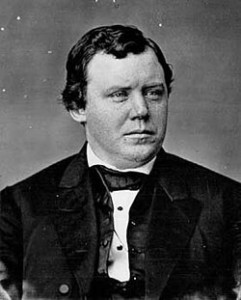 state senator from 1874 to 1878. The People’s Party, of which he was a founder, nominated him for Vice-President of the United States. He was a political liberal, being in favour of women’s suffrage and against slavery.
state senator from 1874 to 1878. The People’s Party, of which he was a founder, nominated him for Vice-President of the United States. He was a political liberal, being in favour of women’s suffrage and against slavery.
Donnelly was also a journalist and the author of several books. In 1882 he published his most famous work[021] on the subject of Atlantis, which is still in print today, although many of the more recent editions have been heavily edited to exclude some of Donnelly’s more outlandish ideas. Bill Lauritzen has remarked that Donnelly’s legal background led him to limit his case for the existence of Atlantis to a discussion of the ‘pros’ while ignoring the cons’.
Donnelly sent a copy of Atlantis to the British Prime Minister, William Gladstone, who was also a classical scholar. The text of the short accompanying note was published in Sykes’ Atlantis magazine(i), but little of the ensuing correspondence between them apart from the text of a second letter from Donnelly(j).
The public reaction to Donnelly’s book was reflected in the New Orleans ‘Mardi Gras’ of 1883 having had an Atlantis theme.
Jason Colavito has drawn attention to the fact that among others, Donnelly was influenced by the earlier work of G.S.Faber(f). Elsewhere. Colavito has commented that “like many of his era, he proved a somewhat corrupt politician. He served the interests of the railroads, and happily took $10,000 in “free” stock from one railroad, which he alleged was a gift for “valuable services rendered” while in office(k).“
Donnelly concluded that Atlantis was real and located in the Atlantic. Apparently, he thought that before the demise of Atlantis, there had been a ‘connecting plateau’ between Europe, Africa and the New World, allowing animal plant species to migrate in either direction.
He also suggested, “the gods and goddesses of the ancient Greeks, the Phoenicians, the Hindus, and the Scandinavians were simply the kings, queens, and heroes of Atlantis; and the acts attributed to them in mythology are a confused recollection of real historical events.” Similar ideas have been developed by the late Joseph Robert Jochmans.
Nevertheless, Donnelly endeavoured to match Plato’s Atlantis with his chosen Atlantic location for the lost civilisation, which can be fairly compared with the equally comprehensive but also flawed effort two centuries earlier by Olof Rudbeck endeavouring to identify Sweden as Atlantis.
Donnelly’s book contains a list of thirteen theses (See: Atlantis: The Antediluvian World), which he then proceeds to ‘prove’, drawing on Plato’s text and the scientific knowledge of this period, not to mention a generous helping of pure conjecture. J.V. Luce remarked that “Donnelly bemuses his readers into a mood of infinite credulity” [0120.29].
In 2017, Stephen P.Kershaw includes a brief critique of Donnelly’s work in A Brief History of Atlantis[1410] and concludes that Donnelly is unquestionably the most influential writer on Atlantis since Plato. I would argue that even though his ideas are more bizarre than Donnelly’s, Edgar Cayce is probably more quoted today than Donnelly. This is just a reflection of the number of gullible people that are out there. Donnelly’s influence has been greatly diminished over the decades as many of his theses have been undermined by later researchers. Cayce’s influence will only diminish if critical thinking becomes more widespread. In the meanwhile, there are a few highly qualified dedicated Atlantis investigators who are slowly closing in on a solution.
Jennifer McKeithen commenting on Donnelly’s book wrote “Though this is a pseudo-archaeological work, Donnelly’s theories remain the source of many of our modern-day ideas about Atlantis. Written in 1882, at a time when much of the world was still mysterious to Westerners, Donnelly proposed an argument that all cultures and peoples originated from Atlantis, which he claimed was destroyed during the Great Deluge described in the Book of Genesis. Today, in the 21st century, experts have debunked most of his theories. However, many of the questions he raised remain unanswered. Despite its many flaws, it’s an interesting glimpse into Western thought during the late 19th and early 20th centuries(l) .”
Many have followed his thinking since then and in 1886, Donnelly published a sequel, Ragnarok[022] to his work on Atlantis that dealt with the idea of a cometary impact with the earth. In fact, in 1883 twelve years after the Great Chicago Fire, Donnelly proposed(g) that Mrs. O’Leary’s cow was not responsible for the conflagration but instead was the result of the impact of a meteor fragment, with Comet Biela as the prime suspect. A key to this explanation may be the recorded fact that at the same time that the fire started in Chicago, huge fires erupted across the lower peninsula of Michigan and in several other places in the Midwest. The O’Leary house was reportedly left standing! That debate continues.
Although he was not the first to make such a suggestion, he was responsible for introducing Velikovskian style Catastrophism to a popular readership over half a century before Velikovsky.
Following the remarkable reception that his books received, Donnelly was elected to membership of the American Association for the Advancement of Science. However, it did not take long before critics emerged. One was John Francis Arundell also known as Lord Arundell of Wardour (1831-1906) who published his criticism in book form[648] in 1885 in which he claimed that Plato’s Atlantis story was based on the account that we have relating to the Voyage of Hanno. It can be read or downloaded online(c).
Donnelly also wrote a 1,000-page work[023] that attempted to prove that Shakespeare had not written all that he has been credited with. Seemingly a man with time on his hands, he also published some works of fiction under the name of Edmund Boisgilbert MD.
Thirty years ago Marjorie Braymer wrote of Donnelly’s work in the following manner[198.65], “Modern editions of Atlantis: The Antediluvian World are streamlined and heavily revised; whole sections have been scissored out and dropped. The reason is clear: Donnelly offered many theories as known and established facts that science did not support even then and wholly discredits today.” Egerton Sykes edited one of those revisions in the 1970s.
Some consider aspects of Donnelly’s ideas to be somewhat racist! However, his influence is still pervasive, exemplified by the fact that the first translation of his Atlantis in Sinhala, the principal language of Sri Lanka, was only published in 2014(d).
Donnelly also questioned the authorship of the works attributed to William Shakespeare in The Great Cryptogram[0023]. The Shakespeare debate has raged for two centuries and now the editors of The New Oxford Shakespeare are convinced, based on computer analysis, that Christopher Marlowe was a co-author of several plays credited, until now, solely to Shakespeare(h). Coincidentally, another Atlantologist Comyns Beaumont held similar views, which he published nearly half a century later in The Private Life of the Virgin Queen[1224], considered to be the least controversial of his literary output!
At the end of the 19th century, Mrs. Donnelly, a fortune-teller from San Francisco, adopted the professional name of ‘Madame Atlantis’!
There is a wealth of Internet material relating to Donnelly e.g. (a)(b).
Donnelly’s Atlantis is now also available as a free audiobook (e).
(a) http://www.geometry.net/detail/book_author/donnelly_ignatius.html
(b) Ignatius Donnelly and the End of the World (archive.org) (New link) *
(c) https://www.archive.org/stream/cu31924028993355#page/n7/mode/2up
(d) https://web.archive.org/web/20140315072609/https://www.sundayobserver.lk/2014/03/09/mon11.asp
(f) https://www.jasoncolavito.com/blog/a-byzantine-claim-about-atlantis-and-noahs-flood
(g) https://barnesreview.org/wp-content/uploads/2016/01/Jan_Feb-2016-TBR-chicago-fire.pdf
(i) Atlantis, Vol.25, No.1, Jan-Feb 1972.
(j) Atlantis, Vol.25, No.3, May-June 1972
(k) https://www.jasoncolavito.com/blog/ignatius-donnelly-and-the-politics-of-atlantis
Carli, Giovanni Rinaldo
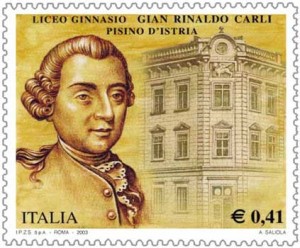 Giovanni Rinaldo Carli (1720-1795) was an Italian who had quite a diverse range of interests, from economics to ancient history to oenology.
Giovanni Rinaldo Carli (1720-1795) was an Italian who had quite a diverse range of interests, from economics to ancient history to oenology.
In a book[087] concerning the history of the Peruvians he expressed his belief that a close encounter with a comet altered the orbit of the earth, lengthened the year and was responsible for the Deluge. A consequence of this catastrophic fly-by was also the destruction of Atlantis, which he located in the Atlantic, leaving the Azores and Canaries as its remnants today.
*Stephen P. Kershaw comments[1410.202] that where Rudbeck used the Atlantis story to support Swedish nationalism, Carli attempted to use it to enhance the prestige of his native Italy.*
His idea of a cometary interference with the earth is an extension of the theories of William Whiston (1667-1752), the Anglican priest who sought to reconcile science and religion. The French astronomer, Jérôme Lalande, developed Carli’s cometary ideas further.

